
Genre: Drama
Director: Frantisek Vlácil
Starring: Josef Kemr, Magda Vásáryová, Jaroslav Moucka, Frantisek Velecký
Language: Czech, German
Duration: 162 min.
Summary:
A mid-13th Century epic following the rivalry between two warring clans, and the doomed love affair of a couple from opposing sides.
Marketa Lazarová is a film directed by Frantisek Vlácil, based on a 1931 novel by Vladislav Vancura, an avant-garde author who was killed by the Gestapo during WWII. Highly regarded, it was voted the best Czech film of all time in a 1998 survey of Czech film professionals and critics, but still remains almost unheard of outside of it's home country.
At once unflinchingly intense in its realism, and obscurely poetic in its narrative, this is an anomaly of a film that has little in common thematically or aesthetically with those of the Czechoslovak New Wave. If anything, it resembles something out of classic Russian cinema. Vlácil himself, came from a different background studying visual arts instead of film, and began his career a good decade before either of Menzel, Nemec, Forman, or Chytilová came onto the scene. However I don't believe it is merely a coincidence that his best work also came about during the same marvelous period of time.
It's set in the Middle Ages, a tumultuous time of conflict amidst waning paganism and rising Christianity, and is filmed with an astonishing attention to historical detail. Honestly I'm no expert on that time in history, so I don't know how accurate the sets, costumes, and living conditions are, but they look and feel entirely genuine. Bringing the past to life in a way that no other film I've seen, except perhaps Tarkovski's Andrei Rublev, could come close to reproducing. At times it feels almost like watching a documentary from an ancient era.
There are highly enigmatic visuals layered in symbolism, and the stylish widescreen black-and-white cinematography is completely immersive and stunning. However, nothing is romanticized, these aren't, in the director's words: "contemporary people dressed up in historical costumes". No, these characters, played mostly by non-professional actors, come across as natural living and breathing specimens, as if they were all plucked right out of the year 1212.
The story is free flowing and complex, difficult to decipher with a single viewing, and simply impossible to adequately summarize in words. It's divided into twelve chapters, each prefaced by an ambiguous title card, and chronicles a brutal rivalry that develops between two opposing clans, the Kozlíks and the Lazars. Beginning with a small conflict that slowly escalates into war, after the young and virginal Marketa, played remarkably by Slovak actress Magda Vásáryová (now a member of parliament in Slovakia), gets kidnapped by the Kozlíks and is forced into a twisted relationship with her abductor.
The events are shown with a continuous and relentless stream of hypnotically striking images. Unforgettable scenes of harsh dirty villages where life is so hard even the clan nobles would envy the comfort of a modern homeless person; frequent shots of wildlife including hungry packs of wolves roaming cold barren snowy landscapes; strange pagan rituals, notably involving the only instance of full-frontal nudity I can recall in a Czech film; and fiercely violent battles fought by brutes armed with crudely forged weapons.
In addition, there are many interesting cinematic devices: odd unannounced flashbacks as well as sudden jumps forward, frequent occurrences of off-screen dialog, and even some curious breaking of the fourth wall. All of which are wonderfully edited together to form the film's intricate and lyrical narrative. Adding to this is the medieval inspired score composed by Zdenek Liska. Comprised of a cacophony of unfamiliar sounding instruments together with haunting choruses that lend an aura of uneasy tension to the atmosphere.
So many films are recklessly heralded as masterpieces, Marketa Lazarová is a rare one that truly deserves it. Which makes it total mystery why this isn't more well known. This is an unique and essential cinematic experience, not only for those with a fondness for Czech/Slovak cinema or historical epics, but for any serious film lover. On initial viewing, it didn't quite capture me enough on an emotional level to call it a personal favorite, however it remains a monumental achievement fully worthy of its title of greatest Czech film ever made.
— Bonjour Tristesse









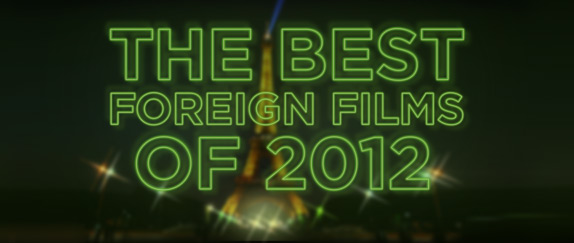




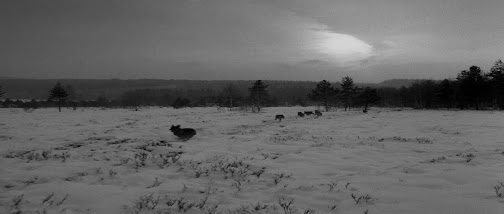




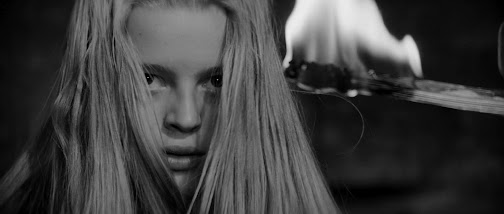

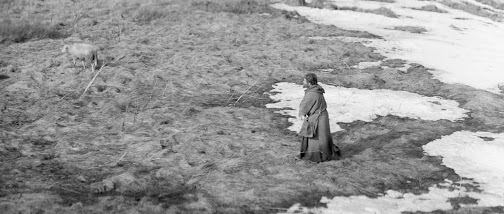



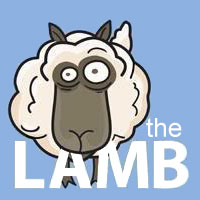




12 comments:
Grim reading and I'd say a grim watch too!
Wow! Looks stunning! The captions are neat! I will be looking for this one.
Great and beautifully written review! This looks like a fascinating film.
Wonderful wonderful review. I'm so glad you loved it - but what's not to love? This really is one of the most incredible films ever made.
This feels like it's gonna go down very harshly. I look forward to this one all the same. It's got substance and I haven't even seen any of it. I'll make sure to find it.
I found this awfully forbidding on my first (and hitherto only) viewing about a year ago, and I found myself liking Vlacil's next film Valley of the Bees better. I suspect, though, repeat viewings will probably help, it's just a matter of finding the time and the inclination...
Yes that is one word to describe it.
Definitely check it out. Those shots don't even come close to showing the true beauty of the cinematography.
Thank you Margaret! This was a difficult one to review.
Thanks Lisa. I don't know that I love it, but I am certainly in awe of it. Hopefully with the recent digital restoration, this finally starts getting the recognition it deserves.
It does have some daunting moments, but the experience is worth it.
I know what you mean, there are some well regarded films I feel the same way about. Au hasard balthazar is one.
I will be watching Valley of the Bees in the near future. Very much looking forward to it now.
Post a Comment